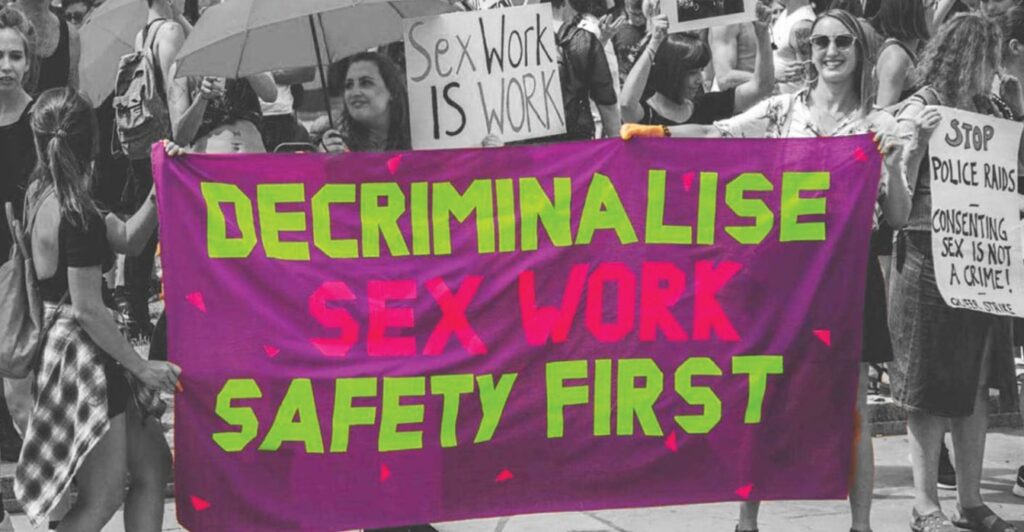A sex worker is someone who engages in sex work, whether it’s a consistent or occasional activity. This term encompasses folks working across various parts of the sex industry. To break it down, sex work involves individuals willingly offering sexual services. It’s a commercial arrangement where sex is exchanged for money or other items, setting it apart from situations involving sexual exploitation or coercion.
Exploring the Evolution and Impact of the Term ‘Sex Worker’

Back in 1978, a sex worker activist named Carol Leigh introduced the term “sex worker.” This term gained popularity after the release of the anthology “Sex Work: Written by Women in the Sex Industry” in 1987, which was edited by Frederic Delacoste and Priscilla Alexander. Since then, the term “sex worker” has found its way into various areas, like academic writings, non-governmental organizations, trade unions, and even international bodies like the World Health Organization. It’s even made its entry into respected dictionaries like the Oxford English Dictionary and Merriam-Webster Dictionary.
Now, why is this term important? Well, some sex workers (also known as prostitutes) prefer to use the term “sex worker” to avoid the negative stigma attached to the word “prostitute.” By using this term, they hope to represent a broader range of people in the sex industry. This shift also helps prevent the term from carrying a negative meaning for those actually involved in prostitution.
Choosing to say “sex worker” rather than “prostitute” goes beyond just semantics. It reflects a sense of ownership over one’s career choices. People who support this term argue that it separates a person’s occupation from their humanity. Calling someone a “sex worker” acknowledges that they are more than just their job – they have many sides to them.

However, not everyone is on board with this term. There are folks who strongly disagree with the concept of the sex industry. These might include social conservatives, anti-prostitution feminists, and others who believe that prostitution is either a crime or a situation of victimhood. For them, the term “sex work” seems to justify what they see as exploitation, whether it’s seen as a criminal act or a form of labor. So, as with many things, opinions on this term are quite diverse!
Carol Leigh was employed by the Hong Kong Massage Parlor on O’Farrell Street when she attended a panel discussion at an anti-pornography conference in 1982. She suggested the term “sex work industry” be the name of the panel and it stuck. Knowing she was onto something, Leigh wrote and performed a one-woman play titled, “The Adventures of Scarlot Harlot,” built around the term she’d invented.
Exploring the Realms of Sex Work: Choices to Challenges

Sex work can come in various forms – think of prostitution, strip or lap dancing, performing in adult content, engaging in phone or online sexual services, and other setups where sexual acts are offered in exchange for money or things. When sex workers provide a whole package that includes sexual services, they’re called full-service sex workers.
Because sex work covers a wide range of jobs, there’s a big spectrum of risks that sex workers can encounter – both in terms of how tough these risks are and what kind of risks they are. Someone in this field might go solo as an independent worker, join up with a company, or become part of a brothel setup. And there’s a lot of variety in the reasons they’re doing it, too – it could be by personal choice, due to pressure, or maybe somewhere in between.
Sex workers might also find themselves hired as travel buddies or for providing services while on the move. But here’s the thing: all of these scenarios could involve willing participation or situations where someone’s not really there by choice.
Diverse Facets of Sex Work: Motives and Realities
Sex workers, regardless of gender, engage in the exchange of sexual services and favors for money or various kinds of gifts. The motivations behind their choice of profession are incredibly varied, spanning from financial obligations and coercion to simply making ends meet or surviving. Interestingly, for some, sex work can also be a path to sexual empowerment. A study conducted in Canada revealed that around a quarter of the interviewed sex workers were initially drawn to the profession because they found it appealing.
What makes sex work intriguing for many is the flexibility it offers, such as the ability to set their own working hours and select their clientele. These features can make it more appealing compared to other service jobs. Yet, there’s also a darker side. Some individuals turn to sex work to fund their addictions. Addiction might be the driving force that leads them into this field, or it might be something they get exposed to after entering.
These motivations are closely tied to the specific environments surrounding sex work in different communities and cultures. And, interestingly, in some instances, sex work intersects with tourism, forming a connection between the two.
The Complex Realities of Sex Work and Transgender Communities
Transgender individuals, particularly trans women and those from diverse backgrounds, often find themselves more involved in sex work compared to the general population. Research shows that illiteracy and low social status are more prevalent among female sex workers in India when compared to women in the general population. Similarly, a study focusing on sex work in Tijuana, Mexico, revealed that the majority of sex workers were young, female, and heterosexual.
A lot of this research has tried to draw conclusions about the larger group of sex workers by studying smaller samples of sex workers and those who manage the trade, like pimps. One report in the U.S. delved into underground sex trafficking using information on illegal drug and arms trafficking, combined with interviews from sex workers and pimps, to estimate the number of sex workers in several American cities.
But here’s the catch: this kind of research can get some serious heat because it seems to give more weight to the perspectives of pimps and folks running the sex work rather than the sex workers themselves. There’s also a critique that these studies might not fully capture the connections between sex trafficking and sex work. It’s not easy to get solid data on sex work either because many places have laws against prostitution and similar activities. And let’s not forget, the secretive nature of sex trafficking, or forced sex work, makes it really hard to measure since it’s all happening behind the scenes.
Moreover, finding a representative group of sex workers in a given city is a real challenge, mostly because the total number of sex workers is usually unknown. Plus, there’s the added difficulty of protecting privacy and keeping things confidential during research. For many sex workers, revealing their identities could mean facing legal trouble and other serious consequences.
Challenges and Fighting Stigma: The Reality of Sex Work
Sex workers often face harmful stereotypes and prejudices tied to their profession, including perceptions of deviance, threats to sexual orientation, and associations with substance abuse. These biases push sex workers to cope by keeping their occupation hidden from those outside their industry, withdrawing from social circles, and even adopting false identities while on the job.
This widespread stigma attached to sex work contributes to a culture that tolerates sexual assault and contributes to shaming people for their sexual choices. Moreover, there’s often confusion between sex work and sex trafficking, even though some sex workers willingly participate in what’s termed consensual sex trafficking. Take, for example, the U.S. Anti-Online Sex Trafficking Act, which was supposed to safeguard trafficking victims but paradoxically ended up criminalizing consensual online adult activity.
These laws and misconceptions seriously affect sex workers. On a global scale, they grapple with barriers accessing healthcare, legal resources, workers’ rights, and even basic legal protection. A survey in the United States discovered that 43% of sex worker participants had experienced different forms of violence, including intimate partner violence, physical assault, armed attacks, and sexual coercion or rape. These distressing realities often lead sex workers to feel that nothing is secure in their line of work.
And it doesn’t stop there – sex workers also face mistreatment from the police. Some law enforcement officers misuse their power to intimidate sex workers, exploiting their fear of arrest to force sexual acts without payment. Shockingly, they sometimes even arrest them after this non-consensual activity. This mistreatment not only jeopardizes sex workers’ safety but also unfairly holds them accountable for crimes against them – a harmful phenomenon known as victim blaming.
This environment of stigma and hostility has profound effects on sex workers’ sense of agency, well-being, and mental health. Thankfully, a growing number of advocacy groups are actively working to dismantle these prejudices and to provide essential resources, support, and empowerment to sex workers.
Legal dimensions of sex work

The legal dimensions of sex work are critically important due to their profound impact on the rights, safety, and well-being of individuals involved in the sex industry. Here’s why they matter:
- Human Rights Protection: Ensuring that sex work is legally recognized and protected as a legitimate occupation is essential for upholding the human rights of sex workers. This includes rights to personal safety, non-discrimination, and access to healthcare, just like any other worker.
- Reducing Vulnerability: Legal recognition and regulation of sex work can help reduce the vulnerability of sex workers to exploitation, violence, and trafficking. When sex work is decriminalized or regulated, it becomes easier to address abusive practices and ensure that sex workers have legal recourse if their rights are violated.
- Public Health: Legal frameworks play a significant role in determining whether sex workers can access essential healthcare services, including HIV and STI testing, contraception, and counseling. Legalizing or decriminalizing sex work can lead to improved health outcomes for sex workers and their clients.
- Preventing Exploitation: Clear legal standards can help distinguish between consensual sex work and human trafficking or coercion. By differentiating these practices, law enforcement can focus their efforts on addressing actual exploitation and trafficking while protecting the rights of consenting adults engaged in sex work.
- Empowerment: Legal recognition can empower sex workers to demand fair working conditions, negotiate safer practices, and seek legal protection against abusive clients or exploitative employers. This can lead to increased agency and control over their work.
- Reducing Violence: Criminalization of sex work often forces it into the shadows, making sex workers more vulnerable to violence and abuse. Legalizing or decriminalizing sex work can create safer environments by allowing sex workers to report crimes without fear of legal repercussions.
- Community Safety: When sex work is driven underground due to legal restrictions, it becomes more difficult to regulate and ensure the safety of both sex workers and their clients. Legal frameworks can facilitate the implementation of safety measures and standards.
- Data Collection and Research: Legal recognition allows for better data collection, which is essential for understanding the needs and experiences of sex workers. Accurate data can inform evidence-based policies and programs that support the well-being of sex workers.
- Social Stigma: Legal dimensions also influence societal attitudes toward sex work. Legalization or decriminalization can help reduce the stigma associated with sex work, promoting a more respectful and inclusive society.
- Fighting Human Trafficking: Legal frameworks that accurately distinguish between consensual sex work and human trafficking enable authorities to focus on combatting real cases of trafficking while ensuring that consenting adults engaged in sex work are not unfairly targeted.
In essence, the legal dimensions of sex work shape the rights, safety, and dignity of those involved in the industry. Addressing these dimensions through thoughtful and well-informed legal frameworks can lead to improved conditions and outcomes for sex workers while promoting a more just and equitable society.
Navigating Health Challenges: The Hidden Struggles of Sex Workers
Sex workers often find it hard to open up about their work to healthcare providers. This could be because of feeling embarrassed, fearing judgment, or simply not trusting that the providers will understand the unique health challenges tied to sex work. What’s more, in places where sex work is considered illegal, the fear of getting into trouble with the law can hold people back from discussing their profession openly.
Legal protection for sex workers is often lacking due to the criminalization of their work. This means that even if they experience violence and report it to healthcare providers, legal action against the offenders might not be an option. It’s a tough situation where their rights aren’t fully safeguarded.
When it comes to health risks, sexually transmitted diseases and drug use are major concerns. Shockingly, around 40% of sex workers who seek help from health centers admit to using illegal drugs. The risks aren’t evenly distributed either – transgender female sex workers face a higher risk of contracting HIV compared to cisgender individuals. This increased vulnerability is caused by a mix of factors like incorrect condom use due to hormone-related erectile dysfunction and engaging in condomless (bareback) anal sex.
Moreover, the challenges go beyond just physical health. Many sex workers grapple with mental health issues like anxiety and depression, which can lead to riskier behavior. Transgender women, who often deal with societal marginalization, face even more challenges due to the social norms they challenge.
Condom use is a vital way to reduce HIV and STI risks, but negotiating this with customers and partners can be really tough. Fear of resistance or violence from customers makes many sex workers skip using condoms. In some places, there are even laws against carrying condoms, making it less likely for sex workers to use protection.
However, there’s hope. Initiatives that support organization and networking among sex workers have shown promising results. They increase access to education about sexually transmitted diseases, promote safer practices, and encourage condom use. Even brothels that make sure to enforce hygiene standards, including condom use, are witnessing a rise in the adoption of safer sex practices among their employees.
In the end, the health challenges sex workers face are complex and deeply tied to legal and societal attitudes. By creating more understanding and supportive environments, we can truly make a difference in the lives of these individuals.
Discover how to become live cam content creator, Adult Industry Insights, History of sex




